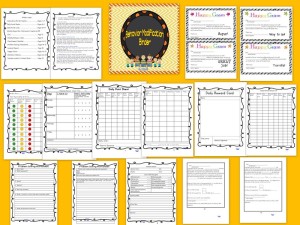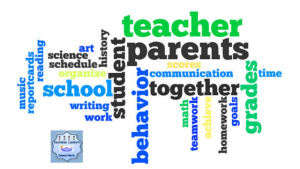Deann Marin at The Best of Teacher Entrepreneurs

Offering for Educators, Comprehensive Teaching Aides. If you’d like to see what else I have to offer please visit my store
Management of a classroom is challenging, whether you teach special education or regular education, there are always a few children that are problematic to say the least. It is not always necessary to set up a behavior modification plan for the entire class. For some children, it is enough to give them a look, a tap on the shoulder, or just say something to them quietly. For others it is not so easy.

Please visit Socrates Lantern’s Tpt Store to view this item
I’ve found that a little humor, warmth, caring, understanding, and empathy for everyone in the class goes a long way. If they see you treating everyone with respect and kindness, it will rub off on them. They need to know that you’re human too and when they realize that you care about them, they are yours for the rest of the year. This will alleviate many of your discipline problems.At the beginning of the year, it is important to be firm, not too friendly, and no smiles. Keeping a straight face was always difficult for me. But, I kid you not, this works, especially later in the year when a child or the class becomes hard to handle, you can say, “Remember how I was at the beginning of the year, do you want me to be like that again?” They usually say NO!!!!
Decide what you want to accomplish for the year and set up the rules, you can do it with them, or ahead of time. Make the rules positive rather than negative. This is the type of behavior that I expect from my 6th graders. I have a poster with the following:
- Raise your hand.
- Listen when someone is speaking.
- Finish class work and homework.
- Pay attention in class.
- Speak quietly in group.
- When you enter the room take your seat.
- Respect all adults and classmates (this includes other teachers, staff, principal, etc.).
- Respect personal property and property of others.
- Gets along with others.
- Walks quietly in line when going to and from the cafeteria, other classes and activities.
- Don’t pay attention to inappropriate behavior of others.
Of course, consequences for ones actions must be spelled out clearly. I use the three strikes and you’re out rule. This applies to everything, from homework to disruptive behavior. They get 3 chances, by the fourth one, they are out. Out means that the student/students will bring a note home letting their parents know that I will be keeping them for a detention.
The child will be required to write his/her name, I will write my name and their parent will sign the form. If it is not brought back, the parent will get a call while the child is present. If this fails, there is a school detention that is longer than mine. No one likes having a school detention.
Usually when someone is kept after school, they must read or do some type of work, ie: write a short paper about what happened and why they are here. You could include, what they did and how they could have handled the situation better. If they were disrespectful, they might write a letter of apology and deliver it to the person. I have made a problem solving sheet for them to fill out, this has proven to be quite effective for most kids. What I like about keeping them after school, is that it gives me a chance to talk to them and find out what issues they might be dealing with. This is effective because, if the teacher has a good rapport with the student, they want to talk about what’s going on. On a side note, homeroom period was utilized not only for
homework help, but time for me to sit and talk with each child. They all loved having their own time to speak with me. It helped to make them feel important.
Unfortunately, there are those students that need more than this. You might try separating them from their classmates, if this is ineffective, you need to figure out what else you can do. An individual conference might help. You can set up goals with them and find out what they want to achieve for the rest of year. That way they have input and feel they have some control over their destiny. They sign the paper, I sign the paper, you can have the principal sign, as well as anyone else that is involved, and their parents. The child brings it back to school and you keep it on file. Of course, this is only between you and the student. If this doesn’t help, you may need to set up a PPT to discuss what else can be done.
If the class trusts you and knows that you care about them, they will want to help to stop disruptive behavior. You will have them eating from the palm of your hands, so to speak. and effective learning will occur. Most kids want to learn and don’t like it when a student acts out or interrupts and they will let him/her know. The best thing they can do is ignore what is happening, they shouldn’t laugh or respond in any way. They can be rewarded for doing this.
You could also reward good behavior either weekly or monthly. Friday afternoon could be game day they could play Yahtzee, Multiplication War Card Games, Bingo, chess, checkers, educational computer games, etc. Since I work with another teacher, we put those who have earned rewards into one room to play games, use the computers, or watch a movie, we give out candy, or popcorn, etc. While those who have homework to finish, or have been disruptive, have to go to the quiet room. It doesn’t take long for them to realize that inappropriate behavior gets them nowhere.
If you are working in a self contained Special Education program, or you have students that are mainstreamed, this is a horse of a different color. You need to set up specific goals, behaviors and consequences for their actions. A time out area, someplace in your room, or if you have an assistant, he/she could take the child to a predetermined area and stay with them until they are ready to come back to the classroom.
You might want to set up whole class rewards such as beads, tokens, smiley faces, check marks, stars, etc. Appropriate behavior is awarded while negative behavior is ignored. In the past, when I taught children with severe psychological problems, each child had a sheet on their desk, I would come by every 15 or 20 minutes and give them a star for good behavior. For example:
- Stays on task.
- Completes task
- Does not talk out
- Gets along with others
- Respectful
They need to get a certain amount of stars to earn a reward which is given out at the end of the day. Make sure you’ve set up about 1/2 hour for them to enjoy their earnings: ie, extra computer time, play games like cards or board games, play with toys, candy and gum also work. You should discuss this with the class ahead of time to see what they would like.
If you don’t want to do this daily, you could do it weekly. Decide how many points they need to earn and on Friday afternoon, those who earned enough could play games, or watch a movie. You might also want to use this monthly. Another thing that I did was purchase inexpensive toys, pencils,notebooks, etc. from the dollar store. Let them know how many points they need to get the object that they want. They really liked this.
No matter what grade you teach, everyone likes to hear encouraging words. Make sure you say something positive to the class as a whole or call a child over to your desk and let them know how proud of them you are for work they have done, or for finally understanding how to do a math problem, use your discretion. You might say, “I loved the way you stayed on task and got your work done,” You really helped Mary, that was so nice of you, or I noticed that you had some trouble with English, how can I help you?” Taking a little time for that personal touch goes a long way and will truly make your life easier in the end.
————————————
http://www.busyteacherscafe.com/printables/forms.html
http://kids.lovetoknow.com/wiki/ADHD_Behavior_Charts
http://www.pbisworld.com/tier-2/behavior-contract/
http://vig.pearsoned.com/store/login/0,,12240,00.html
https://wwwhttp://thecornerstoneforteachers.com/free-resources/behavior-management/individual-plans .teachervision.com/classroom-discipline/resource/6283.html
———————————–
Please visit Socrates Lantern’s Social Media Sites





Take a look at what these other wonderful educators have to say about the subject
































